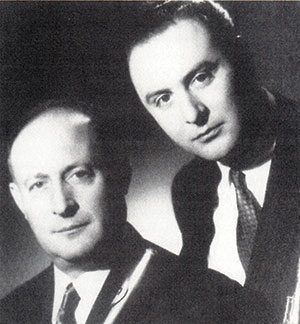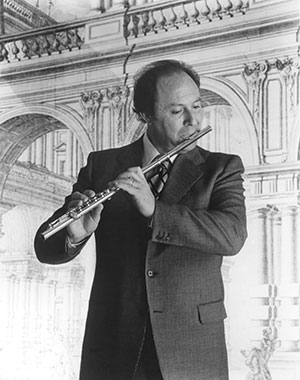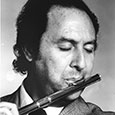To most flutists Jean-Pierre Rampal (1922-2000) is known in every county of the globe as the greatest flutist of all time. However, some of the younger generation may not know how much he has done for the modern flute. Born in January, 1922 in Marseilles, France, Jean-Pierre Rampal first studied with his father Joseph Rampal, a student of Adolphe Hennebains. He received a first prize at the Marseilles Conservatoire in 1937. In 1944, he won the first prize at the Paris Conservatoire National, after only a few months in the class of Gaston Grunelle. Although his parents wanted him to pursue his medical studies, music proved to be his calling: he began performing both on stage and on the radio. His performance of the Ibert Concerto broadcast in 1945 earned him virtuoso status, and he cut his first record, Mozart’s Quartet in D with the Pasquier Trio, in 1946.
Rampal gave the flute prominence by reviving little-known baroque music. During the golden age of the flute in the last 50 years new works were dedicated to or written for him by such composers as Jolivet, Poulenc, Boulez, Feld, and Penderecki. In 1958 Rampal joined the Orchestra of the Paris Opera and he launched an international career with a United States debut that included a triumph with the newly composed Poulenc Sonata. That same year the Academie d’ete de Nice was founded, where Rampal taught students from the world over, the elite of modern flute. Appointed professor at the Paris Conservatoire (1969-1981) he honed the instruction of an exceptional generation of young virtuosos.
During the 1970s and 80s Rampal’s career took a fabulous ascent: he performed as many as 150 concerts, recorded sometimes more than 10 records per year, published editions for Billaudot and l.M.C.New York (almost 200 titles now in print), and taught. Jean-Pierre Rampal’s playing is a model for all flutists and he is praised for his stage presence, natural expression, style, sound, brilliance, spontaneity, but also by other aspects of his personality. His energy, his knowledge of the repertoire, and his capacity for synthesis are simply amazing. His concert and recording programs are balanced, well-conceived, and captivating. Above all, he is one of those rare artists who puts music first even though he is passionate about his instrument.
Here lies, in this mixture of humanity and flute enthusiasm, the reason for an exceptionally long career: more than half a century after his first concerts and recordings, Jean-Pierre Rampal continues to travel the world and record. Destiny smiled upon him from the day he first played his world-famous and mythical instrument, the only golden flute ever made in 1869 by Louis Lot, whose history remains very secret since the death of its first owner in 1890. How did this flute reach miraculously the hands of JeanPierre Rampal 50 years ago? Like the mythological Pan, perhaps he played the flute in another life.
Who has most influenced your career?
There are many influences, but the first and foremost was my father. I wanted to play the flute because I heard it at home; however, my father was not in favor of me playing the flute because he feared it would distract me from my studies. In fact, that’s exactly what happened: I went as far as third year in medical school, but my heart wasn’t really in it.
 Your father was a student of the old French School. How did the French School evolve from Hennebains and Gaubert through Marcel Moyse?
Your father was a student of the old French School. How did the French School evolve from Hennebains and Gaubert through Marcel Moyse?
Marcel Moyse followed his personality and strayed somewhat from the Hennebains and Gaubert school, but not entirely; it was always a point of reference. Actually, my impression is that Marcel Moyse wanted to expand the flute’s capabilities, like a violinist, as it were. He wanted to play the flute differently. To that effect, he had to change the school itself: it was unavoidable. He forced his sound and was criticized for covering or having a heavy sound; he strayed from the Gaubert and Hennebains line. I think their teaching encouraged will power – as Moyse himself – to create another sound. Gaubert and Hennebains had considerable facility. Moyse told me many times about their exceptional lips and fingers. He, on the contrary, had not been so lucky. He had to work very hard on the instrument. He blamed his son Louis for not working hard enough. He said, "I worked like a beast." It was difficult for Louis to follow in his father’s footsteps. Marcel Moyse worked hard, and that is why he wrote so many volumes of flute studies.
The last time I saw Moyse in Brattleboro, he was still patiently writing simple exercises by hand: C-C#-D, D-D#-E. They were elementary, but he always worked on the sound. He changed the way he played over the years, because from what I gathered through his American students, he emphasized a natural lip flexibility. At first he played somewhat tightly, but then he returned to the Gaubert or Hennebains style of natural playing. I was lucky to follow this school not only through my father, but also through the influence of other virtuosos of the piano, violin, and opera, and by orchestral music. These influenced my style and phrasing.
Was it difficult for you to learn flute technique?
No. I started to play the flute when I was 12. I was so excited because I wanted to play for years, but I had to wait, so I progressed quickly. When I enrolled at the Marseilles Conservatoire in October, I knew almost nothing. At that time, to be accepted, a student had to play one of the lessons in the Altes Method. I played the third lesson, et voila! By the end of the school year I played the second and third movements of the Mozart G major Concerto, and I played them well. My father did not want me to get my first prize because he did not have enough students. This was the main reason I was in the class: he had only 4 students, and the director told him he would have to teach solfege if there weren’t any more students. He would have been mortified, so he accepted me to increase the number of students in his class. As you can imagine, it was out of the question to get my prize the first year. By my second year I won my prize without any problem playing the Perilhou Ballade.
Did you play many duos with your father?
Wow, yes! We started playing easy duets by Devienne and Altes. He always played the second flute to accompany, which was excellent for intonation, for musicality, for everything. In his teaching, my father was a real tyrant: he would not forgive a mistake of even one note. I could not begin a new Altes lesson until the previous ones were learned.
That is the genius of the Altes method that others lack. Many excellent beginner books, methods, or well-conceived exercises have been written since, but the Altes remains the best. A good professor shouldn’t ignore any aspect of sound, intonation, pulse, rhythm, and style. The first Altes lessons don’t seem difficult but are extremely well thought out and efficient. When playing the first note a student learns phrasing with a natural, elementary flexibility. The progression may seem difficult at times, but when a lesson is well learned, the next one seems perfectly logical. This method will never go out of style.
Has opera also influenced your musicianship?
Yes, opera has always interested me, especially male voices such as the French tenor Georges Thill. He was a wonderful example of style, diction, and phrasing. His singing was instinctive and natural: the aria from Gluck’s Alceste, for instance, is a monument of phrasing. You cannot find a better example to learn the fine style and smooth phrasing of Mozart. Everyone should listen to his recordings. His music has indisputably influenced me.
At what age do you think a student should start playing the flute?
The best age is between 10 and 12. Before that, not much is accomplished. A child has to be well-developed physically for the flute. Not only is size important for breathing and arms, but also for the hands. Fewer bad habits develop while the bones are still soft. It is not good to start too late either, around 18 to 20, but it’s perfect between 11 and 15.
Do you insist on the concept of natural flute playing?
Yes, it’s the key to everything. A good professor teaches students to develop every aspect of flute playing naturally. With certain exceptions, it is difficult for a child of 7 or 8 to adopt a position in which he feels completely at ease with the instrument. A natural posture allows a player to build every aspect of playing with natural breathing. I often cite the example of a diver as he comes out of the water: he does not need to suck in air, he only has to open his mouth. When playing the flute, there is no hindrance, no obstacle, no tightness between the base of the air column and the flute. A natural position allows a flutist to play expressively as well. Certain things have to be learned, such as breathing deeply and maintaining air pressure in great phrases or long runs, but that comes with experience and is acquired naturally. It is necessary to breathe in the same fashion as speaking or singing. In fact, a professor should always be alert to teach naturally and help to correct defects by listening carefully.
I still remember the lessons of the French School. For example, Hennebains said: "You must nourish the scales", and my father repeated this often to me. Scales are not simply a succession of meaningless notes. Something has to connect each note. The great bassoonist Maurice Allart said that scales should be played as if performing a concerto. My father told me the same thing about the Taffanel and Gaubert scales. Actually, scales are as interesting as a concerto. Without the scales, precious little remains of a concerto.
 How did pianist Pierre Barbizet help you develop as a musician?
How did pianist Pierre Barbizet help you develop as a musician?
We spent much time together sightreading. We read from old arrangements for flute or violin and piano of the Beethoven, Mozart, and Schubert symphonies. We read violin sonatas, everything! It was a real frenzy. If young players want to have a career or at least play very well, music must be a passion. If you force yourself to practice one hour of flute every single day, you will never succeed. You must be truly passionate. Music is the food we need to survive. In the same way, a child should not be forced to play. That’s why I never pushed my children because they were not passionate about it. Jean-Jacques is a violin maker and plays well for an amateur, but he would never have been able to make a career, even as an orchestral player. On the contrary, it’s a good sign if the instrument has to be wrestled from someone. He might not make a dizzying career, but he will play well. What is important for everyone, deep down, is not to have an enormous career but to live well and enjoy life. My father did not have a huge career but he enjoyed himself all his life!
What do you think about the present level of flute playing?
It’s magnificent! The quality and general level have improved so much that soon it will be necessary to require superhuman pieces for first rounds of competition. Today flutists have hallucinating virtuosity. Even when I taught at the Paris Conservatoire (1969-1981) I noticed that the technical level was increasing very quickly. Once I brought in Briccialdi’s Concertina on Bellini’s La Sonnambula, but the students were not interested. A few years later, we worked on the flute transcription of Mendelssohn’s Violin Concerto, and some played it as if it were a picnic.
The steady progression of flute playing actually started in the 1950s. Certain works that measured difficulty quickly changed. Jacques lbert himself, whose concerto written for Marcel Moyse was considered one of the most difficult pieces ever written, was astonished when students could play it easily. By the same token, who is afraid to play Andre Jolivet’s Chant de Linos? Everywhere I meet extraordinary flutists. Even if they sometimes forget to sing or phrase well, they are able to understand and integrate new concepts quite quickly. The future may not shine for everybody because of the stiff competition and the considerable number of flutists, but music will certainly benefit from increasing levels of musicianship. It may not be possible to do better; I don’t know how far it can go. Maybe it will seem as easy as electronics, but already, it seems there is no room for error.
Do you think that such playing is a detriment to musicality?
Oh no, it goes without saying that the technical level improves; technique has to be perfected so that it can be forgotten. Technique has to be strong so the performer is no longer conscious of it and can then make only music. Even if you are very musical and have an enormous heart, without the means to express yourself, that heart remains very small and no one see it. Even if someone knows music well and has an extraordinarily artistic spirit and fabulous phrasing, if he lacks technique, he cannot take advantage of all his qualities.
Now technique is not everything. With only technique and no musicality, everyone will be bored after 15 minutes. Many flutists with astounding fingers leave me profoundly indifferent. In moments such as that, I don’t like the flute. If there is no phrasing, no pouring out of the guts, then too bad; technique is virtuosic, but a player also has to sing. Such a player should not be surprised when he does not win anything, and this phenomenon does not concern only the flute.
Optimally technique services the music, not just the flute. The flute is not an end in itself, it is only a means: we play the flute and through it we express what we feel. The flute is not important. I have a hard time understanding all the emphasis on trying new head joints and flutes. Expression is what counts, not the flute.
How do you give priority to expression and music and still be passionate about the instrument?
In spite of what many think, it is not incompatible. Be passionate about the instrument, but aware of the intimate measure of things, to the point where technique may be forgotten. There is a difference between passion and obsession. I have always been passionate about the flute and I still am, but not blindly. When I play, I no longer try to amaze people by technique or flute effects. That is not interesting. Many flutists today know how to bring everything out of their instrument, with unbelievable embouchure and dynamics, but in my opinion, they do not put them to good use. Some interpretations become demonstrations. It’s even more of a shame when those people are deeply musical, because they don’t realize how they can touch the listener. If there are too many effects, it becomes senseless. The effect is not to demonstrate the flute; it has to proceed from an exceptional musical intention.
To reach that point, you have to be in great shape and forget about the instrument; that’s when we start to make music. Isaac Stern once said, "When I’m playing well, it seems as if my violin has disappeared. I can’t see it anymore." This is also true for the audience: when the instrument disappears, the artist is in great shape and the concert will be great. It goes without saying that this does not happen all the time. Life would be a bit difficult and sad if you ceaselessly forgot your instrument. It’s good to have it under control and to feel it.
How can a player reach perfection while forgetting the instrument? Could perfection be the enemy of good?
I still think that this is the only way to reach a pinnacle on the flute. Many people never take risks, do not want them, and in fact work to that end. It is regrettable to practice long tones with a tuner, for example: you have to play with your ears or it’s not worthwhile. If you don’t, you cannot, among other things, realize colors in the sound. Colors can only be produced by the ears and the brain. They are seen and then produced with an imagined sound. You cannot teach someone to do this or that. You play in your head, you look elsewhere, and you do it with your lips. For me the one who does not take risks is not a complete artist. Take the risk of falling on your face, maybe crack a few notes, or play a couple of notes a bit out of tune. If you do not take any risks, it is obvious . Those who play carefully are often boring, to say the least. Many play sadly, obsessed by not making an mistakes. I know many such players who should let go a little, but they cannot. This is often the consequence of playing in the orchestra. Orchestral flutists want at all costs to be perfect; they play evenly and cleanly.
Having said this, playing cleanly has more than one meaning. My father, for example, was very musical. For him, the word "clean" was ideal. Above all it meant that he felt perfectly comfortable with what he was hearing. After a concert he once told Isasc Stern: "Bravo, Isaac. It’s beautiful what you do. It’s clean." Some compliment! Luckily I had warned Isaac and he was very touched because it was a heartfelt compliment from my father.
Always seek progress in every area to increase your means and to be free of the instrument, but do not hesitate to take risks or chances. Perfection in itself is not an ideal because it does not exist, but there are exceptional moments, states of grace.
Has your insatiable curiosity about repertoire augmented your career?
Certainly. First I was passionate about music; even when I was only 13 or 14, I wanted to know everything, to play everything. Later, this curiosity helped me make people aware of the flute. Before that nobody really knew the baroque and classical repertoire, except for Bach sonatas, Mozart concertos, and two or three other things. After the war, the public demanded more music and at the same time, the recording companies developed long playing records. I channeled my work in that direction. I searched absolutely everywhere for repertoire. Later I consulted catalogues and libraries sent me photocopies and microfilms. I still have this curiosity about repertoire even if I am at the end of my career. I make fewer recordings, but I am still interested in repertoire. Ingo Gronefeld’s book on the flute concertos from 1750 to 1850 is magnificent. I would like to order tons of music.
Are there any works in particular that you know exist but are missing from our repertoire?
Ah, of course. Wilhelm Friedmann Bach’s four flute concertos are missing and it’s truly a shame because they are probably superb music. They do exist, but they are probably somewhere in Russia. One day, Father Carl de Nys (French musicologist) told me he saw two freight cars leave Germany for Russia full of music from the Berlin Library, part of which, as you know, was destroyed during the war. Therefore, if these concertos still exist, they must be there, but how do we find out where? It would be difficult to search for them. I know that the beginning of the manuscript of Tchaikovsky’s flute concerto is also somewhere in Russia, but no one has access to it. I still dream of finding these works someday.
How do you know that these sketches exist?
In Tchaikovsky’s letter to Taffanel, he apologizes for not welcoming him to St. Petersburg and he writes: "As far as the concerto for flute is concerned, you will have it, I promise you." Some sketches of this exist at the Moscow Conservatory, confirmed to me by Russian flutists, but everyone knows it’s difficult to search. I don’t understand this attitude. When something is known to exist, it must be talked about. It’s ridiculous to hide a discovery.
Has your interpretation of the Bach sonatas and Mozart concertos evolved over the years in the many recordings you have made?
It’s true that the Bach sonatas have been different each time, but I did not plan or think about a particular interpretation each time. I play instinctively, which is very important in baroque music. If I recorded these sonatas again today, they would certainly be different.
As for Mozart, it’s not the same thing. I don’t feel like changing them; the music seems obvious to me and, furthermore, I think we all have more or less the same opinion about these works. The differences in interpretation relate more to sound than to style. You cannot reinvent a style for Mozart.
Many flutists are reluctant to perform transcriptions despite all of the flute versions of the great works for violin. What is your opinion?
I don’t think we should back away from transcriptions. If something not written originally for flute sounds like a transcription, with a series of disconnections, range problems, or many changes, then be careful. However, some transcriptions might be worthwhile musically. A typical example is the Khatchaturian concerto. The composer offered it to me, took the musical initiative, and after thinking about it myself, I jumped at the opportunity. It was worth the wager because the work is now a standard in the repertoire.
Transcriptions have to be well done, as close as possible to the original, but suitable for the instrument. Certain works are appropriate for the flute and not others, such as Vivaldi’s Seasons or Mendelssohn’s Violin Concerto. For the latter, the version published by Wilhem Popp in the 19th century is mediocre; however, it is possible for flutists to play the violin part, which I published. I agree it is very difficult, but it works and it’s playable. Many of my students at the time in the Conservatoire sightread it almost effortlessly. Now that playing levels are even higher, the Mendelssohn seems even easier. However, just because a transcription is naturally attractive to flutists, the work should not be played in concert because it is too closely associated with another instrument. At any rate, I never dared.
Of course, some transcriptions were realized during the composer’s lifetime and there are also modern arrangements. It does not matter, but it’s interesting historically. Certain period transcriptions are not good, such as Mozart’s oboe quartet, but if a transcription does not have too many changes and sounds good, then it’s perfectly acceptable to play it. Some things will sound better on the flute than on the violin, such as the Franck sonata, with the exception of th second movement. On the other hand, if a transcription is playable without disfiguring either the work or the instrument, and if it brings something new to the repertoire, then why not?
What advice would you give to young soloists?
Today many people work with a sponsor or enroll in special programs for performing opportunities, but this is short sighted. In reality, it flaws the rules of the games considerably. For less talented people, they may be able to perform more; however, if greater talents play in mediocre programs, it will not help them build their careers.
Should an artist who wants to develop his career follow his own intuition?
Exactly, even if that means adapting to strictly monographic recordings. Do not be afraid of establishing your own requirements. It was sometimes necessary for me to insist strongly on programming certain works. Sometimes we are requested to do things of average interest, but it ends up being worthwhile.
You simply must love to play the flute. For me and for most flutists it is like a disease. Some people play the flute but are not impassioned by it. They may play at it one or two hours a week, but serious players develop good habits early on. If you practice while you are young your flute fever will remain with you. Never a day will go by that the flute does not beg you to be played. Make it sing, even in the simplest of phrases, and you will grow in that love of the flute making music.
* * *
On Developing Technique
"The only suggestion is to work more, practice more, try harder, and all that. There is only one way, and it is no secret. For any instrument you have to pass through scales, exercises, arpeggios, everything. It may seem sterile to students, but that’s because they never understand what they could be able to get if they had better technique."
One of the techniques that yields effective results for Rampal but might be easily abused by other flutists is his unusual method of articulation. He says that the point of tonguing is to get a sharp attack, which requires having the tongue actually come out between the upper and lower teeth, instead of the more common method of touching behind the top teeth. He compares the tongue to a shutter that releases the air column sharply. If the tongue touches just behind the teeth, he says, "it makes the attack da-da-da-dada. No shape. Music needs shape, eh? And if you want to have shape, you must have attacks when you start the tone, just as a violinist uses energy to attack a note with the bow or a pianist attacks the keys cleanly."
When asked which syllable he thinks of, he says a short tu is the nearest to the sound you should make, but in fact no full syllable is actually used. You think of the short tu sound just to move your tongue properly.
One little technique Rampal uses that helps him in rapid passage work is that he always uses the Bb thumb key instead of the standard crossfingering for Bb. Most teachers tell students to use the Bb thumb key only as an alternative trill fingering, but Rampal says it is simpler and has better intonation than the cross-fingering.
Rampal thinks that his remarkable breathing is no big deal. When asked if he has a breathing secret, he replies, "No, I just open my mouth. Do you have a breathing secret when you speak? No, you open your mouth, you breathe. When you’re talking, you just naturally breathe between phrases if you need a breath. In music, it’s the same." He explains that it is almost always unnecessary to take a huge gasp. "Only in a few occasions do you need so much air so fast," he says, because in general "music is very natural."





